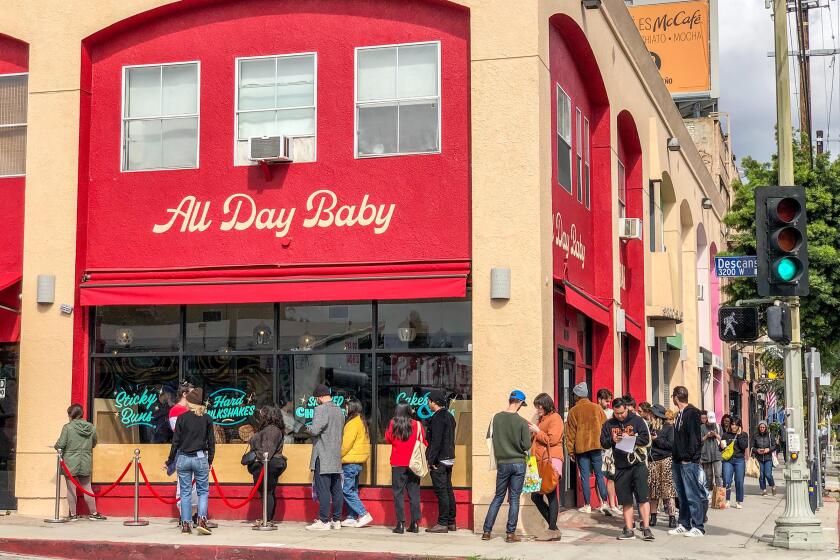Here are 5 tip-offs that can help you avoid farmers market cheaters
Deputy director Ed Williams of the Los Angeles County Agricultural Commissioner’s office is training his inspectors to recognize signs that a farm may not have actually grown an item that it is selling at a certified farmers market, which is a violation of state law and market regulations.
Mindful shoppers may also want to be alert to some of the indications of cheating, but should be aware that appearances may be deceptive. For example, a vendor may be selling certain items under a second certificate, which legitimately allows him to sell for another farm; or stickered fruit may really come from a farmer’s packinghouse.
If you suspect that a vendor at a certified farmers market in Los Angeles County is selling produce that he did not grow, contact the Agricultural Commissioner’s office on their website or telephone (562) 622-0426.
Out of season
Tip-off: When a vendor sells an item that appears to be out of season for his area, that may be an indication that he did not actually grow it. In this case, Jose Zamora of Oceanside was fined $500 by San Diego County for selling produce, including serrano chiles such as those pictured among the accompanying photos, in April, far too early in the season for field-grown peppers.
Caution: Some growers have greenhouses that enable them to grow produce that would be out of season for field-grown crops. Other vendors grow in multiple locations, and seasons vary widely among different growing areas.
Commercial cartonTip-off: If you see a farmers market vendor removing produce from a commercial carton that does not have a plausible link to the farm, that may be an indication that it was not grown by the farm. If you see a banana box filled with melons, that’s probably just a reused container; but if you see a box like one pictured above, photographed by a Los Angeles County inspector at the Ontario Farms stand at the Motor Avenue farmers market, and apples of the same variety indicated on the box are inside, that may warrant scrutiny.
Caution: Some farmers, for example most almond growers, do have their produce processed at a commercial facility, and the box may bear a name that is not the farm’s.
Waxed, uniform size and appearanceTip-off: When a vendor grows only a small amount of a crop, but at the farmers market sells specimens that appear to be of uniform size and appearance or look like they have been waxed, that is a tipoff that they may have been commercially packed, and may not have come from his farm. Inspector Ibrahim Abdel-Fatah of the Los Angeles County Agricultural Commissioner’s office said that when he saw the waxed lemons pictured above sold by Xiong Yang at the Silver Lake farmers market on March 9 this year, “they were shining so brightly I was almost blinded.”
Caution: Some farmers, mostly those with medium or large plantings, may in fact send their own produce to a commercial packinghouse, or have their own packinghouse.
Produce not on certified producer’s certificateTip-off: All produce vendors at certified farmers markets are supposed to post their certified producer’s certificate conspicuously, listing the quantities of plants and production for each item that they grow. If you see an item on the table that does not appear on the certificate, such as these peanuts sold by a vendor for Frank Suarez at the Del Rey farmers market pictured above, that may be an indication that it was not grown by the farm.
Caution: Very often when a farmer sells an item that is not on the certificate, he really is growing it, but has not yet amended his certificate. Agricultural authorities always contact the farmer’s home county to verify whether he is in fact growing the item.
Mismatch between production and sales quantitiesTip-off: If a producer’s certificate lists only small quantities of an item, but the vendor sells large quantities for many weeks, that may be an indication that he is supplementing. In one case Abdel-Fatah noticed that Walker Farms displayed 90 pounds of apples at the Gardena Hollypark farmers market in March, about five months after harvest, but the producer’s certificate listed only four trees with yearly production of 200 pounds.
Caution: Inspectors painstakingly gather and collate the load sheets that detail what a vendor has sold, and it is basically impossible for a layman to do this. Nevertheless, if you see a farmer who produces 50 pounds of cherries a year, and he has that amount at just one market each week for three months, it may be worth alerting the market manager or agricultural authorities.
ALSO:
RECIPES: Easy kale, beet and squash salads
Super-secret world of restaurant hand signals
World’s hottest pepper hits 2.2 million Scoville units
More to Read
Eat your way across L.A.
Get our weekly Tasting Notes newsletter for reviews, news and more.
You may occasionally receive promotional content from the Los Angeles Times.










